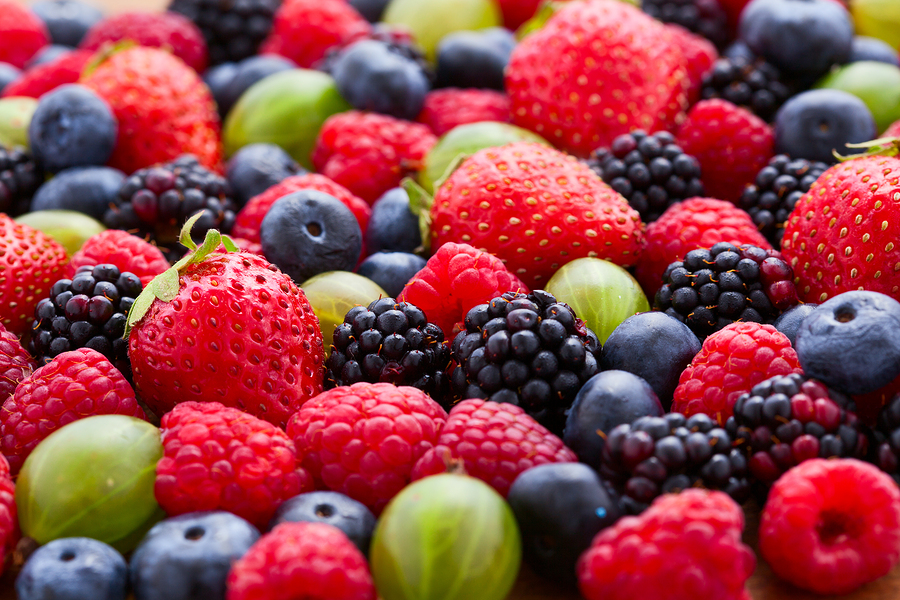- Make It Yourself Lavender Heart-Shaped Bath Bombs!
- 20 Things You Never Knew About “Down There”
- 12 Best Foods For Those Suffering From Arthritis Pain
- 12 Personal Hygiene Mistakes Almost Everyone Makes (Mom Never Told You About #4!)
- 15 Medicinal Plants And Herbs From The Cherokee People
- 12 Mind-Blowing Benefits Of Drinking Coconut Water During Pregnancy
- 12 Outstanding Winter Foods That Won’t Fatten You Up Like A Christmas Turkey
Can Eating More Berries Help You Lose Weight?

Photo credit: bigstock.com
When people are trying to lose weight, the first things that usually come to mind are diets, cutting calories, and cutting back on tasty foods in general. Since food is what causes us to put on weight, it only makes sense to think that eating less is the best way shed extra pounds. Less calories, less weight. How could it be any simpler?
But scientists are learning that losing weight isn’t that simple it all. In some cases, eating more can actually help you lose weight, but only if you’re picking the right foods.
New research has shown that eating more fruits, and particularly more berries, can help you lose weight and improve your overall health. Let’s explore why.
What’s So Special About Fruit?
To begin with, fruits contain a lot of water. Water-rich foods provide necessary hydration, but they also help those who eat them feel full longer, preventing them from overeating. Fruits also have a lot of fiber, which both aids and slows down digestion. This too helps prolong the feeling of being full after eating.
But the benefits don’t stop there. Fruits contain a type of natural compounds called flavonoids. These powerful compounds perform many different and important functions in all plants and animals, but the specific tasks vary from one species to the next.
In plants, flavonoids facilitate communication between cells. They also play a role in determining the specific color a fruit or flower has. In humans, flavonoids have been linked to a variety of health benefits, including:
- Reduced risk of heart disease. According to studies conducted at the Cleveland Clinic and Oregon State University, flavonoids can contribute to lower blood pressure and cholesterol. While more research is needed to confirm the role flavonoids play in improving cardiovascular health, initial research results appear promising.
- Anti-inflammatory properties. Inflammation is linked to all manner of health problems, and foods rich in flavonoids, like berries, can help combat this nuisance.
- Antioxidants. Oxidative stress contributes to the aging process. Antioxidants can effectively keep you biologically “younger” and healthier by eliminating free radicals which damage cells. Fruits, especially berries, are rich in antioxidants. This also ties back into the first point, since high levels of free radicals can increase your body’s levels of LDL cholesterol (the harmful kind) and increase your risk of heart disease.
But most important of all, flavonoid-rich diets have been linked to the curbing of unwanted weight gain in humans.
Continue to Page 2

Photo credit: bigstock.com
The Flavonoid Mega-Study
The “BMJ Study” was one of the largest studies of its kind ever performed. The purpose of the study was to determine whether or not the consumption of flavonoid-rich foods was associated with changes in weight over time. The study lasted for 24 years and involved over 124,000 adults. Those participating in the study were required to report their weight every 2 years and any changes in their diet every 4 years.
Obviously, 24 years is a long time, so the researchers had to adjust for things like changes in lifestyle, such as smoking and levels of physical activity. But even after adjusting, the results were quite positive.
The results showed that the participants who ate more flavonoid-rich foods had an easier time maintaining their weight or losing weight. The average adult between the ages of 18 and 49 gains about 1-2 pounds per year. But the participants who consumed large amounts of flavonoids only gained 0.16 to 0.23 pounds per year. In some cases, participants eating the most flavonoids lost weight. This appears to show a direct relationship between eating more flavonoids and the prevention of unwanted weight gain. This is not some miracle cure for obesity, but it does show that eating more flavonoids can help you prevent weight gain and play a role in reversing it.
There are different subclasses of flavonoids. The ones that produced the most statistically significant results were flanan-3-ols, flavanols, flavonoid polymers and anthocyanins. Of these different subclasses, anthocyanin-rich foods appeared to be the most beneficial with regard to weight control.
There was some criticism of the study. “Consider the type of person who would eat lots of colorful fruit,” said Naveed Sattar, Professor of Metabolic Medicine at the University of Glasgow in Scotland. “You can imagine they may be more health conscious, better educated etc and lead healthy lifestyles in general.” This is a fair observation to make, and it raises the question of correlation versus causation. But given the incredible health benefits of fruits that have already been established, it seems unreasonable to dismiss the findings of the study. As it so happens, most peer review for the BMJ Study has been positive.
Continue to Page 3

Photo credit: bigstock.com
Which Berries Do It Best?
It’s worth noting here that it’s not just berries that contain flavonoids. Non-berry fruits like apples, bananas and Asian pears also have these beneficial compounds. Other foods like radishes, cacao, green and black tea, onions, peppers and even certain types of wine contain them as well. But this does raise the question: Of the foods which do contain flavonoids, which ones are the most beneficial? The answer always points back to berries.
Specifically, berries show the highest concentration of anthocyanin, which was determined to be the most beneficial of the flavonoid subclasses. Good sources of anthocyanin include blackberries, raspberries, cherries, grapes, blueberries, black currants, boysenberries and strawberries. These berries also include the other flavonoids mentioned above and are packed with antioxidants, vitamins and other goodies.
READ ALSO: Lose Weight Fast By Adding This One Thing
The bottom line is that berries are just too beneficial to not add your diet.They make a perfect snack, they’re sweet, delicious and so packed full of nutrients that there simply isn’t any downside to enjoying a handful every day. As with any diet change, it should be viewed holistically, and will produce the most beneficial results part of a healthy, physically active lifestyle. Start eating more berries today and don’t be surprised if, in addition to feeling more energetic and healthy, you drop a little bit of weight as well.
References:
www.berryhealth.fst.oregonstate.edu
fiber































